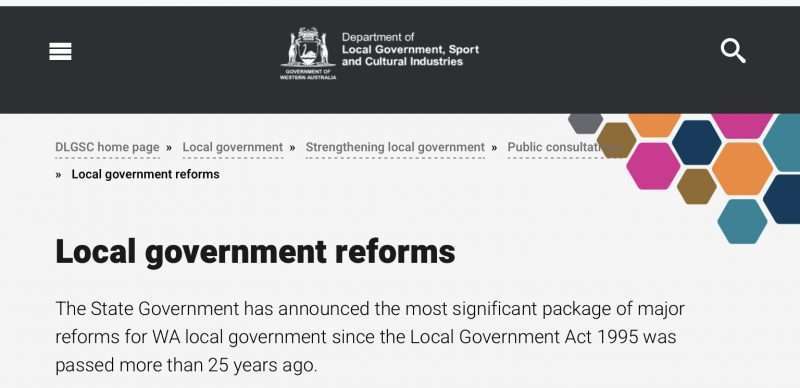The Minister for Housing and Local Government, John Carey has today released plans
for major reforms local government reforms on which he invites public consultation.
The Minister says the reforms represent the largest change to local government in more than 25 years.

Reforms are aimed at improving the transparency, accountability and efficiency of local government across Western Australia.
The. Insisted says the reforms will deliver benefits for ratepayers, residents, small businesses, community organisations, and local government staff and elected members.
The reforms are based on the findings and recommendations of a number of reports and consultation undertaken over the past five years, and represent the most significant package of reforms to local government in Western Australia since the Local Government Act 1995 was introduced more than 25 years ago.
The package is based on six major themes:
* Earlier intervention, effective regulation and stronger penalties;
* Reducing red tape, increasing consistency and simplicity;
* Greater transparency and accountability;
* Stronger local democracy and community engagement;
* Clear roles and responsibilities; and
* Improved financial management and reporting.
Central to the reforms will be new measures to proactively address dysfunction in local government earlier. This includes the establishment of a new Local Government Inspector, who will be appointed to investigate and manage complaints, and will have the powers of a standing inquiry.
The Inspector will be supported by specialist independent monitors who can be appointed to work within a local government to resolve problems. Local governments will also be able to proactively request the assistance of monitors, who will have a range of expertise such as governance, financial management and conflict resolution.
A separate Conduct Panel will replace the existing Standards Panel. The Conduct Panel will review more serious complaints and assess evidence provided by the Local Government Inspector.
Penalties will be strengthened to ensure better standards of compliance and behaviour, including fines and suspensions for breaching the Act.
In an effort to improve transparency within the sector, the reform package includes a range of new measures including the requirement for all councils to record meetings and make them available online. New online registers will be set up to provide greater accountability to ratepayers covering areas such as leases, community grants, contracts and declared conflicts of interest.
Significant changes will be made to strengthen democracy and facilitate more community engagement. This includes direct election of mayors in larger local governments, the introduction of preferential voting and new rules which will outline the number of elected members on any given council, based on population within the local government.
Rules will also be tightened to ensure only legitimate residents or businesses are eligible to vote or run for council. This will help crack down on the use of ‘sham leases’.
Other proposed reforms include:
* the introduction of a mandatory state-wide caretaker period for all local governments;
* a new requirement for all local governments to implement a rates and revenue strategy to provide ratepayers with greater clarity around the setting of rates of spending;
* the role and responsibilities of councillors and local government CEOs will be further defined in the Act, helping provide a clearer delineation between the functions of council and the CEO; and
* cutting red tape by streamlining procedures, approvals and local laws across local government. This will help to drive better efficiency and consistency across local governments, and deliver significant benefits for small business, community organisations, residents and ratepayers.
The Minister says the package will build upon reforms introduced in the previous term of the McGowan Government, including new laws that work to improve transparency, cut red tape, and support jobs growth and economic development – ensuring that local government works for the benefit of local communities.
The consultation period is open for feedback on the implementation of the reforms. Further details on the proposed reforms can be found here.






